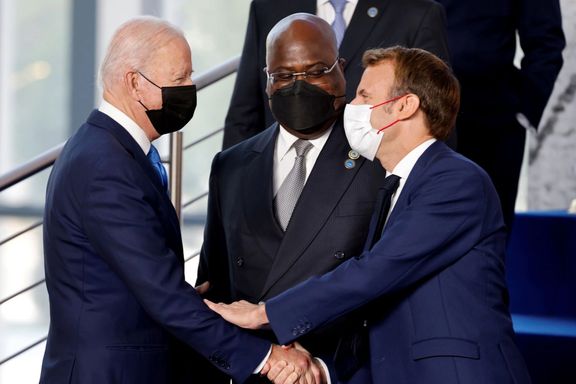France Playing ‘Bad Cop’, Iran Stands Strong, Tehran Media Claim

France is taking the role of “bad cop” in the run-up to Iran’s nuclear talks with world powers November 29, several media outlets in Iran said this week.

France is taking the role of “bad cop” in the run-up to Iran’s nuclear talks with world powers November 29, several media outlets in Iran said this week.
This followed the French foreign ministry spokeswoman saying Thursday that Paris was keeping open the option of moving censure of Tehran at the mid-November board meeting of the International Atomic Energy Agency (IAEA), the United Nations cooperation and monitoring body.
There had been speculation in September that the United States or Europe might move a resolution at an earlier board meeting critical of Iran, which reduced IAEA access earlier this year after the killing of a nuclear scientist and attacks on its atomic sites.
Nour News, a news website affiliated with the Secretary of Iran's Supreme National Security Council (SNSC) Ali Shamkhani, published a video Saturday dubbed “France and Commencement of Bad Cop Game.”
The video suggested that France had taken up the role in response to "immediate positive reaction of most partners in the negotiations" to Deputy Foreign Minister Ali Bagheri-Kani announcing Iran would resume talks in Vienna November 29 aimed at reviving the 2015 deal, the JCPOA (Joint Comprehensive Plan of Action). Nour described the words from spokeswoman Anne-Claire Legendre as “threatening.”
‘Diplomatic spearhead’
The state-owned, English-language paper Tehran Times on Friday also called France a bad cop. The paper suggested that Iran setting a date for talks had lowered diplomatic tensions and so prompted Paris to “spearhead a diplomatic campaign against Iran.”
"France moved to ramp up diplomatic pressure on Iran by putting more emphasis on the current state of play between Tehran and the UN nuclear watchdog," the paper noted. But it said Paris was unlikely to press ahead with censuring Iran as this “would probably anger Iran at a time when it announced a return to Vienna only grudgingly.”
Mikhail Ulyanov, Russian envoy to the IAEA, poured oil on any troubled waters with a tweet citing the Tehran Times and insisting that "no single participant in the ViennaTalks will do anything that can derail negotiations on JCPOA." Moscow has consistently stressed the importance of the Vienna talks ensuring that both that United States – which left the JCPOA in 2018 – and Iran respect the terms of the agreement.
On Saturday Iranian Foreign Minister Hossein Amir-Abdollahian spoke by phone to Russian counterpart Sergei Lavrov. According to the Iranian foreign ministry, Amir-Abdollahian told Lavrov that talks would make rapid progress once the US and the European JCPOA signatories – France, Germany, and the United Kingdom – ruled out "demands exceeding the JCPOA.” There have been various reports that the US has tried to secure an Iranian commitment to a ‘follow on’ agreement covering regional defense issues.
‘Iran’s full briefcase’
In a commentary headlined "November 29 With Iran's Full Briefcase," Javan newspaper, affiliated with IRGC, argued that Iran was in a stronger position than in 2013, when negotiation began leading up to the JCPOA.
It is widely argued that Iran has been boosted by the failure of US ‘maximum pressure’ sanctions − introduced by the Trump administration in 2018 − to secure their stated aims including Iran ending all uranium enrichment, scrapping missile defense, and breaking links with regional allies.
Javan also pointed out that the Iranian nuclear program had significantly expanded. "Iran is going to sit at the table for talks with full hands," it argued, pointing to its stockpiles of 210kg of uranium enriched to 20 percent and 25kg enriched to 60 percent.
Under the JCPOA, Iran enriched no higher than 3.67 percent, but began exceeding various JCPOA limits in 2019, a year after the US left the agreement. Tehran started 20 percent enrichment in January and 60 percent enrichment in April, explaining the moves as responses to US sanctions, and to the killing of a nuclear scientist and attacks on its atomic facilities widely attributed to Israel, which has opposed the JCPOA.